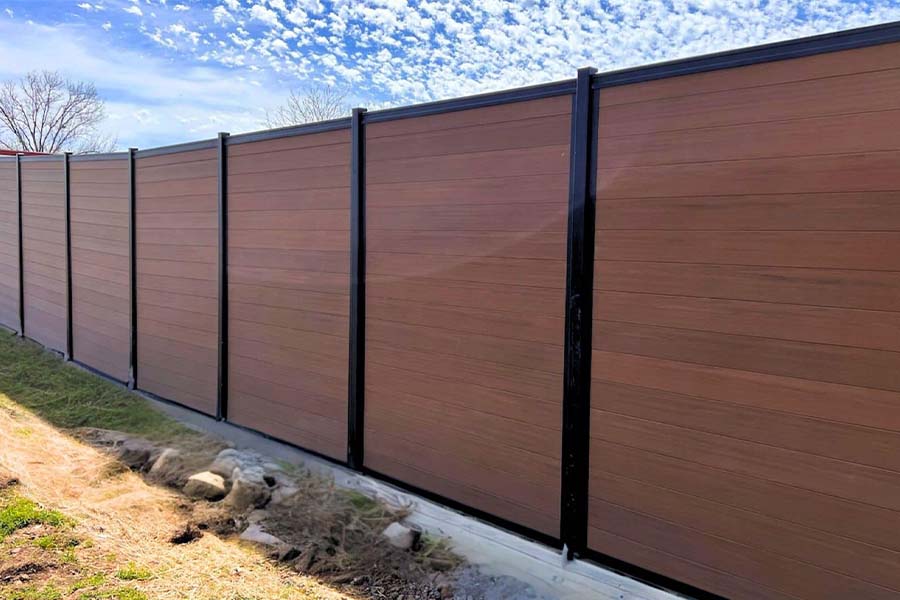All Categories
Featured

When setting up a fencing, picking the ideal material is vital to stabilizing performance, appearances, and budget plan. Wood, vinyl, and light weight aluminum are among one of the most generally selected fencing products, each with its strengths and drawbacks. This guide discovers the advantages and disadvantages of these choices to aid you make a notified decision.

Wood Fence. Pros:. All-natural Elegance: Timber's ageless appeal can improve any kind of residential property with its timeless and warm look. Customizable: You can repaint, stain, or carve wood to fit your design preferences. Affordable: Wood fence is initially more affordable compared to a few other materials. Eco-friendly: As a renewable energy, wood is biodegradable and frequently considered green. Disadvantages:. Maintenance-Intensive: Routine securing, paint, or discoloration is required to avoid damage from weather and pests. Prone to Degeneration: Without correct care, wood can rot, warp, or crack with time. Shorter Life expectancy: Generally, wood fencings last 10-15 years, depending on the sort of wood and upkeep. Timber is a fantastic choice for those who value aesthetics and want to invest in normal upkeep to preserve its appearance and resilience.
Vinyl Fence. Pros:. Low Upkeep: Plastic calls for marginal treatment-- just periodic cleaning with soap and water. Weather Resistant: It doesn't warp, rot, or catch insect damage, making it very sturdy in various climates. Long life: Vinyl fencings can last 20-30 years with little to no fixings. Style Variety: Available in a vast array of styles, shades, and structures, consisting of wood-like appearances. Disadvantages:. Greater Preliminary Price: Vinyl fencings are much more expensive upfront compared to wood. Vulnerability to Cold: In incredibly winter, vinyl can end up being susceptible and fragile to breaking. Limited Repair Work Options: Matching substitute panels can be challenging if damages occurs. Plastic fencing is excellent for homeowners looking for a durable, low-maintenance service that offers contemporary adaptability.

Aluminum Fence. Pros:. Rust-Proof: Aluminum resists corrosion, making it an exceptional option for damp or humid environments. Resilient: In spite of being light-weight, aluminum is strong and can endure extreme weather condition problems. Reduced Maintenance: It calls for minimal upkeep, normally just occasional cleansing. Long Life-span: Light weight aluminum fences can last decades without substantial wear and tear. Classy Style: Usually used for ornamental purposes, aluminum secure fencing adds a sleek, advanced want to homes. Disadvantages:. High Initial Financial investment: Aluminum fencings are amongst the more expensive choices on the marketplace. Less Privacy: The open layouts usual with light weight aluminum fencing do not give much personal privacy. Prone to Damage: While resilient, light weight aluminum can damage if hit with enough force. Aluminum is a superb choice for homeowners prioritizing aesthetic appeals and resilience without needing much upkeep.
Making Your Choice. When deciding between light weight aluminum, vinyl, or wood fence, consider your priorities:
Timber suits those who appreciate a natural look and do not mind putting in upkeep initiative. Plastic is the very best alternative for those looking for a low-maintenance, weather-resistant solution. Light weight aluminum uses sleek style and durable sturdiness but may do not have personal privacy. By very carefully assessing these products' functions, you can choose a fence that complements your residential or commercial property while fulfilling your useful and aesthetic requirements.
Latest Posts
Find Out Cut Costs on Car Maintenance with Montclare Auto Repair’s Exclusive Deals
Published May 28, 25
1 min read
Check Out Montclare Auto Repair’s Top Auto Repairs and Why Drivers Trust Them
Published May 25, 25
1 min read
How to Know When Your Car Needs Professional Vehicle Service at Montclare Auto Repair
Published May 24, 25
1 min read
More
Latest Posts
Find Out Cut Costs on Car Maintenance with Montclare Auto Repair’s Exclusive Deals
Published May 28, 25
1 min read
Check Out Montclare Auto Repair’s Top Auto Repairs and Why Drivers Trust Them
Published May 25, 25
1 min read
How to Know When Your Car Needs Professional Vehicle Service at Montclare Auto Repair
Published May 24, 25
1 min read